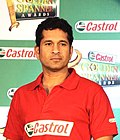| |||||
| Centuries: | |||||
|---|---|---|---|---|---|
| Decades: | |||||
| See also: | List of years in India Timeline of Indian history | ||||
Events in the year 1989 in the Republic of India.
1989 was a very important year in the history of World and India. That was the year in which Berlin Wall was brought down and the Tiananmen Square protests and massacre happened. [1] [2]
Contents
In India this was the year of profound importance. It was the year, from which the political discourse of India started to change, with events that heralded the rise of Hindu nationalism, Kashmir militancy, Mandal Politics, Indian cricket etc. [3] [4] [5] and marked the shift from era of single party rule to decades of coalition governments ahead. In socio-political discourse of country, this was a year which started the shift of, sense of history in minds of people from a consensus based one that emerged post 1947 to contested one that emerged along with Ram Janmabhoomi Andolan. [6] [7] [8]

